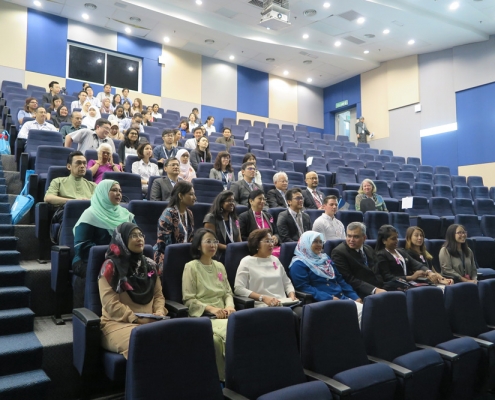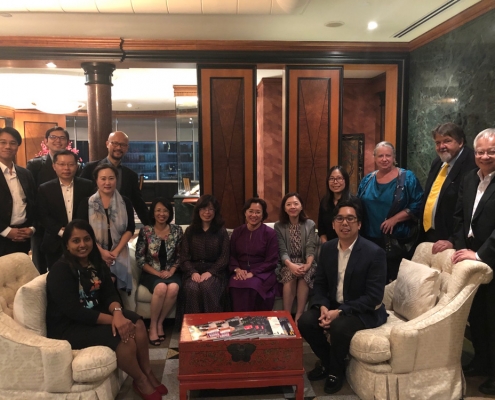TMU joins ‘Malaysia’s Oxford’ for partnership-building
Scientists discuss stem cells, tropical medicine advances, and education collaboration
A TMU delegation of 8 professors and 5 Global Engagement staff promoted Taiwan’s New Southbound Policy by expanding educational links with Malaysia’s leading institution of higher learning, the University of Malaya (UM).
TMU professors were the largest cohort of guest presenters at a stellar Stem Cell and Cancer Symposium on October 17 and 18. This event also drew speakers from noted institutions in Switzerland, India, Hong Kong, England and Singapore.
A parallel Infectious Diseases/Tropical Medicine (IDTM) Symposium gathered three TMU parasitologists and six UM scientists. TMU Assistant Professor Ting-Wu Chuang discussed new methods for accurate prediction of dengue outbreaks using maps and weather data, Associate Professor Po-Ching Cheng shared his work toward a vaccine for deadly rat lungworm (Angiostrongylus cantonensis), and Distinguished Professor Chia-Kwung Fan discussed a mechanism linking Alzheimer’s disease to canine roundworm, which is extremely common in humans but rarely tested for.
The Stem Cell and Cancer Symposium drew scores of participants to the UM Medical School, where TMU Prof. Hung-Cheng Lai took the stage the first morning to discuss “Oncogenic ten-eleven translocation 1 (TET 1) in ovarian cancer.” Prof. Lai met a potential collaborator, UM Prof. Dr. Sy Lay Khaing, at a concurrent poster session.
TMU Distinguished Professor Rita Yen-Hua Huang gave the October 18 keynote lecture on “Niche modulation in cancer stemness and stem cell therapy.” TMU Associate Professor Shian-Ying Sung spoke on “The role of protein-protein interaction in cancer metastasis,” and TMU Associate Professor Ming-Heng Wu discussed “Stromal galectin-1 regulates inflammatory tumour-microenvironment and cancer malignancy.”
Finding common ground
Distinguished Professor Yuan-Soon Ho from TMU gave an overview of the university’s cancer research to officials and faculty at a UM-TMU Joint Collaboration Forum on October 19. Prof. Ho and the cancer research team at TMU have been awarded the Taiwan Ministry of Science and Technology’s largest scientific research grant for the past several years.
Prof. Ho and Prof. Huang discussed TMU research and facilities relating to cancer and stem cells, and Dr. Chuang did the same for infectious disease studies. The University of Malaya team in turn discussed the Faculty of Medicine’s strategic research plan focusing on ageing and regenerative medicine, cancer and drug discovery, and parasitology. The TMU team received tours of several labs and learned about UM’s state-of-the-art research facilities, including labs for mosquito breeding and medical microbiology.
TMU Office of Global Engagement Dean Pei-Shan Tsai joined the UM networking meeting to give feedback on areas of common interest. She expressed TMU’s strong interests in working with YBhg Professor Dato’ Dr. Adeeba Kamarulzaman, dean of the UM Faculty of Medicine, to expand educational and research collaborations that began with a UM group’s 2009 visit to TMU.
Dean Kamarulzaman, a signatory to the first agreement between the universities in 2010, noted that during her team’s visit to Taiwan, “TMU stood out [during a tour of Taiwan hospitals]… It’s not fancy, like some medical tourism hospitals here, but it’s very functional. We have a lot to learn from you.”
The University of Malaya is Malaysia’s leading university, and was founded in Singapore by British colonists as King Edward VII College to train doctors in 1905. Some 30,000 students are enrolled in ten colleges on a verdant 304-hectare main campus. A handful of administrative and student exchanges have ensued between the two schools’ medical and public health faculties.
Sin Chew Daily offers support
In addition to scientific discussions with Malaysian researchers, the TMU delegation also visited Sin Chew Daily, Malaysia’s largest Chinese-language news provider, to explore potential collaborations between the two organizations. Meetings at the 90-year-old media firm’s headquarters focused on interviews with the TMU team and presentations about both institutions.
This was followed by a discussion of possible synergies that could help Sin Chew’s 1.3 million readers benefit from TMU’s educational and clinical resources. General Manager Tan Kim Chuan praised Taiwan’s advanced medical education and research development, noting that it provides excellent-quality care at lower prices than those of unevenly regulated Malaysian hospitals. The GM also said Taiwan outshines Malaysia in medical tourism, thanks to affordable packages for families accompanying patients as well as more humane admission and payment policies.
Because the Sin Chew organization uses readers’ donations to provide emergency funding for applicants with acute medical conditions who cannot afford treatment, Mr Tan suggested a collaboration scheme to send patients with special needs to TMU hospitals. Sin Chew also offers scholarships to encourage students from lower-income backgrounds to pursue university educations and indicated interest in working with TMU to provide scholarships for Malaysian students.
Whether scientific, educational or charitable, clearly TMU’s Malaysian partners were interested in the delegation’s ideas for cooperation opportunities, and the October events were a great success.
For interviews or a copy of the paper, contact Office of Global Engagement via global.initiatives@tmu.edu.tw.












